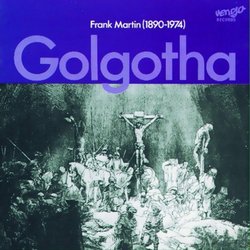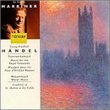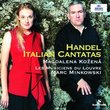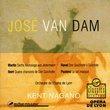| All Artists: Martin, Bargen, Decker, Blasius, Siemens Title: Golgotha Members Wishing: 0 Total Copies: 0 Label: Audite Original Release Date: 1/1/1988 Re-Release Date: 6/26/2001 Genre: Classical Style: Opera & Classical Vocal Number of Discs: 2 SwapaCD Credits: 2 UPCs: 409410214012, 4009410214010 |
Search - Martin, Bargen, Decker :: Golgotha
 | Martin, Bargen, Decker Golgotha Genre: Classical
|
Larger Image |
CD DetailsSimilarly Requested CDs
|
CD ReviewsDeserves to be Mentioned in the Same Breath as BACH! Christopher Forbes | Brooklyn,, NY | 04/18/2003 (5 out of 5 stars) "Frank Martin's Oratorio Golgotha is not the most popular piece of religious music in the 20th century. In fact, it is barely known outside of Switzerland. But it is perhaps the greatest passion to be written since Bach's great masterpieces, and certainly one of the handful that say something truly unique about this age old story. As such, it deserves a greater hearing. From what I can piece together (the notes and libretto of the work is in German only, and my high school German is less than serviceable) Martin undertook this work in 1947 after being moved by Rembrandt's etching "The Three Crosses". Martin chose to create the work, with no commission, as an act of pure faith. The piece is not meant for liturgical use and in fact, as the text is a conflation of all four Gospel passion texts, it could not be used liturgically. But Martin wished it to be sung in a church and it sounds wonderful in such a setting. The text is traditionally structured. It is in two parts, each part introduced by a chorale meditation, ala Bach. Each section is then broken down into discreet scenes covering the events of Passion week from the Entry into Jerusalem to the Crucifixion. Each scene is concluded with a "meditation" from St. Augustine, which functions as the chorales do in Bach's passions. The language is typically Martin, lush tonal modulating harmonies, laced with spiky dissonances and meandering chromatic melodies. Martin is equal parts atonal/Germanic and French/impressionist. The mixture is compelling in this work. Highlights include the glorious shouts of Hosanna at the entry into Jerusalem; the heartfelt lament in the Garden; the beautifully written dramatic moments with Pilate and the crowd, and the stunning and understated Crucifixion. Martin, unlike many modern composers, understands the secret behind writing this text. His music gets progressively darker and more tragic...it slows down and yet remains dramatically riveting. This paradox is something that Bach understood but that few other modern composers can touch. Even Penderecki misses this. (Arvo Part's St. John Passion gets some of this effect, but Part is modeled more on the Gregorian passions and on Schutz, so his drama is of a different sort.) By the time of the final words on the cross, Martin has stepped so far aside, that it seems no more to be a piece of music. Rather it seems like the actual experience itself! This is a live recording made in 1988 and released on CD recently. The performance is really quite good on what must be a challenging piece of music. My only caveat is that the work is performed in German, and in fact is touted as the first recording of the German version. Though Martin prepared the German language version himself, the work was originally written in French, and the German doesn't always sit well with the music. It also tends to tilt the patented Martin French/German musical split much more toward the German, loosing some of the mellifluousness of the original French text. With this in mind, it might be better to invest in the recording of the French text of this work. Though the German version is perfectly serviceable, it is sort of like having Verdi's Il Lombardi only in it's French guise as Jerusalem. Any way you slice it though, this is an important choral work and the most moving passion I've heard from a modern composer. It puts almost any other setting of this text after Bach's to shame I think. Listening to it is a truly spiritual experience...one that I highly recommend." Not 1st Choice for Martin's Sublime 20th century Passion Nicholas A. Deutsch | New York, NY USA | 05/10/2003 (4 out of 5 stars) "This is a follow-up "shopper's guide" to the review by weirdears, with whom (incidentally) I am in complete agreement about the work.
This recording is one of four currently available of "Golgotha," and in my view ranks last, both because it is sung in German translation - all the others are in the original French - and because the conducting strikes me as sluggish. (Rhythmic vitality counts for a lot in Martin's music, one reason among many why Ernest Ansermet was such an eloquent advocate.) The 1969 composer-supervised recording (Erato Ultima 3984-24237-2) remains an excellent all-round recommendation, with a strong quintet of soloists, conducting by Robert Faller which successfully balances drama and introspection, and good sound. BUT: no text or English translation. (Shame!) The two more recent versions come with both. The 1994 performance (Cascavelle VEL 3004) under Michel Corboz (who was chorus master in 1969), recorded - like 1969 - at Lausanne Cathedral, boasts full sound and fine choral and instrumental work, and - with one crucial exception - good to excellent soloists. Corboz's conducting carries great conviction, though the performance as a whole is stronger in the meditative passages than in the more dramatic scenes. This may be due in part to the shortcomings of the baritone who sings the part of Jesus: though he has an attractive tone, his French is uneven and uncommunicative, and he lacks the necessary fire for the role. The last version comes from Vienna in 1998 (Haenssler Classic 98.327), a performance on a very high level with powerful conducting by Herbert Boeck. Although only one of the singers (so far as I can judge) is a native French-speaker, everyone sings with great understanding of the words; baritone Petteri Salomaa is outstanding as Jesus. Somewhat to my surprise, as I generally prefer "native" singers and have a high regard for Corboz's other Martin discs (including the oratorio "In Terra Pax" and the 1974 chamber cantata "Et la vie l'emporta," the composer's last work), I would choose the Haenssler Classic version over the Cascavelle. But you can't really go wrong with any of the three versions." |

 Track Listings (5) - Disc #1
Track Listings (5) - Disc #1




